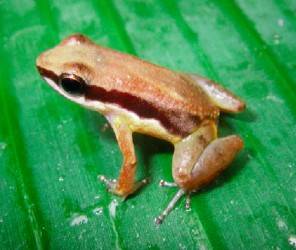A new species of poison dart frog has been discovered by scientists during a study to determine the impact of tourism on biodiversity in a tract of the Iwokrama Rainforest.
The scientists named the frog Allobates amissibilis— in Latin, “that may be lost” — in recognition of its home,

which was the set for British author Sir Arthur Conan Doyle’s 1912 book, The Lost World. The frog was discovered near Turu Falls, a waterfall at the foot of the Iwokrama Mountains in Central Guyana, a report on Mongabay.com said.
According to the Senckenberg Nature Research Society, the intent of the study was to investigate populations of another frog, the Hoogmoeds harlequin frog (Atelopus hoogmoedi), to determine whether it might be impacted by planned ecotourism development in the region.
While the researchers were conducting their survey, they came across the thumbnail-sized frog, which they couldn’t identify. Subsequent analysis showed it to be an undescribed species, the report said.
Allobates amissibilis is now the third Allobates species known from Guyana. Like other poison dart frogs, it derives its toxicity from the ants, mites, and other invertebrates on which it feeds.
The species is thought to be a “micro-endemic” — found in only a small area of habitat.
As with most new discoveries, this micro-endemic species was immediately declared endangered because no one had seen it before.





